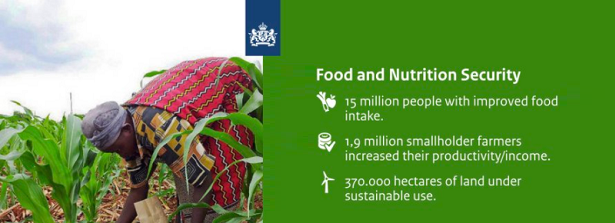Dutch Development Results 2016 in Perspective: Food and Nutrition Security highlights

The Dutch Ministry of Foreign Affairs has published a website which presents the results that the Netherlands, together with national and international partners, has achieved in the field of inclusive sustainable development co-operation in 2016. At the same time, it highlights future challenges of (geo) political tensions, migration, sustainable trade and investment, climate change as well as attention for women and girls.
This news item aims to update Food and Nutrition Security professionals on the recent results of the Dutch policy in this field. It highlights the Dutch policy framework on food security as well as policy results from 2016. Earlier results from 2015 can be found here.
The Dutch policy agenda focuses on aid, trade and investment in order to stimulate fair and sustainable growth from which everyone benefits. Find more on this policy in the document “What the world deserves: a new agenda for aid, trade and investment”. In order to achieve these ambitions, the Dutch government invests in themes in which it is strong, including Food and Nutrition Security. In 2016, the Dutch government invested 335 million euros on Food and Nutrition Security policy.
Dutch ambitions on Food and Nutrition Security policy
The Netherlands has the ambition to contribute a fair share of the total challenge under the “Sustainable Development Goal 2: end hunger and children’s undernourishment, double smallholder productivity and income, and ensure the sustainability and resilience of food production systems by 2030”. These Dutch ambitions include: lifting 32 million children out of undernourishment; doubling productivity and/or income for 8 million farm holders; and bringing their farmland (about 7.5 million hectares) under sustainable management. See also this video on how the Netherlands takes up the Food Challenge 2030.
Food and Nutrition Security Policy Highlights 2016
- 15.5 million people (especially children) have received direct treatment for (severe) malnutrition, supplemental feeding, extra vitamins and/or a deworming treatment which resulted in their improved food intake
- 1.95 million farm holders improved productivity and/or income as a result of receiving training, advice, technology, financial services, inputs, infrastructure and organizational strengthening.
- 370,000 hectares of land was used more eco-efficiently, by use of practices that increase yield (output) per unit of natural resources, i.e. water, manure, fertilizer and land (input).
Contribute to zero malnutrition in 2030
The combined efforts on food intake, access to food and nutritional resilience should eventually result in the elimination of malnutrition. In 2016, nutrition activities supported by the Netherlands have directly reached more than 33 million people/children. Of those, more than 15 million have demonstrably improved their food intake and more than 1.3 million demonstrably obtained better access to food and the nutritional situation of nearly 1.3 million of those became demonstrably more resilient. In 2016, the measured effects focused more on improved intake of food compared to 2015.
Contribute to doubling agricultural productivity and income by 2030
The Netherlands supports agricultural growth activities – such as trainings, financial services and organizational strengthening -, that are focused on productivity and income, access to markets and resilience of farming systems. Netherlands-supported interventions in 2016 directly reached more than 7 million farm holders. Of these nearly 2 million demonstrably improved their productivity and/or income, more than 1.5 million improved their market access and more than 1.3 million improved their resilience to stresses and shocks. In 2015, also 7 million farm holders were reached. In 2016, less programs focused on access to markets compared to 2015. Furthermore, less results were reported on improved resilience, which was partly compensated by more results from a productive safety net programme in Ethiopia.
Contribute to sustainable land use
To support conservation practices, the Dutch government supports the efficient use of natural resources, watershed/landscape management and agro-ecological resilience. Netherlands-supported land-use activities directly reached more than 1.3 million hectares of farmland in 2016. Nearly 370,000 hectares of this farmland was demonstrably used more eco-efficiently, more than 100,000 hectares came under improved natural resource management of the surrounding environment and more than 175,000 hectares demonstrably became more resilient. In 2015, a comparable result was achieved for improved natural resource management.
Enabling conditions for improved Food and Nutrition Security
It is important that better enabling conditions are created which support Food and Nutrition Security. Priorities for the Netherlands are tenure security, knowledge infrastructure and institutional capacities. For the past three years, Dutch efforts on secure land rights have resulted in tenure security for a total of more than 2.5 million people, of which an estimated 50% are women. In 2016, around 2.0 million farmers were reached with new knowledge and technologies through demand-driven, tailor-made approaches. Furthermore, around one hundred research, extension and vocational training institutions have been supported and strengthened and these have importantly contributed to the quality and impact of farmers’ training and extension. In addition, in 2016 more than 1,000 institutions were strengthened in their capacities, their functioning and their networking and learning.
_ _ _
Please find the complete Dutch Development Results on Food & Nutrition Security here.
How this thematic area of Food and Nutrition Security is related to the other sustainable development goals is displayed on the SDG page.
This project page contains footage of specific projects on Food and Nutrition Security, with which the stories and figures are illustrated.





